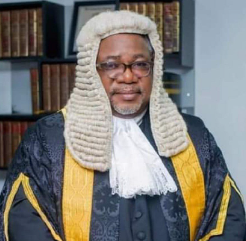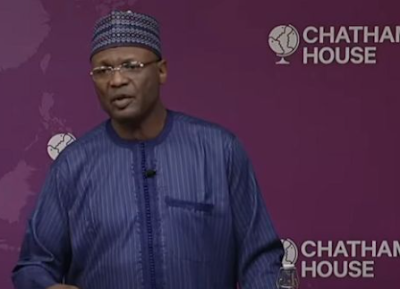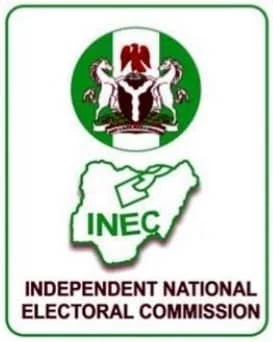Since February 2022 when the new Electoral Act was signed into law, one viral ‘song’ by the Independent National Electoral Commission (INEC) and its officials was allusions to transmitting the 2023 election results electronically, which now has become a subject of judiciary interpretations, writes REMMY NWEKE.
Trending transmission:
Remember the trending video of the then Inspector General of Police, Mr. Ibrahim Idris tagged 'Transmission, transmission' where he was seen obviously struggling embarrassingly to read a speech with over 20 'transmission transmission' saga in 2018.
For whatever that transmission transmission means, it reminds one of the recent controversial judgment of the Presidential Election Petition Tribunal (PEPT) led by Justice Haruna Tsammani, which has become infamous of late with various new meaning to our constitution and electoral guidelines at this digital age.
One thing seems obvious in the IGP Idris epochal 'Transmission transmission' clip that came to mind while watching those judges pelting grammar and vocabulary meanings from dictionaries, as if they were never covered in the nation's statutes; was that Idris did not write the speech and invariably those reading the so-called judgment mostly like Idris did not own their speeches.
It was not long the news wave was agog with the court judgment. On siting a copy allegedly dully certified by the registrar of Appeal Court was the extraneous header entitled ‘Tinubu Presidential Legal Team (TPLT).’
As matter of fact, having a such reminder not only exposed the lack of ingenuity in its preparation which may not be distanced wholly from the rumours that made a round that some senior lawyers of and in All Progressive Congress (APC) colour must have contributed ostensibly to the final copy, which the team seems over-excited to share without due diligence so as to remove any suspicious content.
Historically this is the first time a Certified True Copy (CTC) of a judgment will appear with a header as far as one can remember or phantom, but then what is a header in documentation and Word Processing industry.
INEC trended so much on the internet because of its allusions to transmit the 2023 election results, which has become a subject of judiciary interpretation.
Forensically, in effort to examine the veracity of the CTC,
ITREALMS reached out to some experts in documentation and Word Processing applications, who faulted the explanation of the Tinubu Presidential Legal Team (TPLT) over purported 'water-mark' in the copies of controversial judgment of the Court of Appeal in respect of the Presidential Election Petition judgment delivered on September 6.
According to the experts who spoke to ITREALMS on anonymity, fracture the explanation offered by the Coordinator of TPLT, Babatunde Ogala, SAN, saying that what actually appeared on the document is a 'header' used in identifying document from bulk of others in a database. They also defined a 'header' as text that is placed at the top margin of a page or every page in a document, while a footer is placed at the bottom, or foot, of a page in that order.
"Typically these areas are used for inserting document information, such as the name of the document, the chapter heading, page numbers, creation date and the like," they revealed, and equally cracked the claims by Ogala that "On collecting our own copy, we immediately scanned and water-marked with the inscription 'Tinubu Presidential Legal Team ‘TPLT’” before circulating the scanned soft copies to the lawyers in our team," saying that in first instance why put header on a document not originally from you, thus he may not be telling the whole truth.
Basically in word processing, the forensic document experts said that 'header' is used to identify a given file from the bulk and if TPLT was to share document to their team of lawyers as a scan copy as claimed by Ogala, why put header to it, which makes his argument washy. In addition, the Word Processing experts informed ITREALMS that "If it were to be a scanned copy, there is what is called paper positioning or mark to show it was a scanned document, rather than the header, which is correctly placed given the Word Processing format of a margin.”
They posited that what TPLT have in the document is not 'watermarks' which is different from 'headers' as referenced by Ogala, insisting that "Watermarks in Word Processing is usually inserted in the middle of the document for authentication and originality effect at the background.” A watermark, therefore, "is a light and faded image of text, picture, and logo that appears behind the main content of the document, which basically, is a lighter shade in the text, so that reader can read the document very easily.” Just as they maintained that the purpose of any watermark "is to make it more difficult for the original image to be copied or used without permission."As said by them, since Ogala is claiming the document came from Registrar, TPLT should not have put 'its watermarks' to such a document if it were not originating from them ab nitio. Submitting that either Ogala does not know “what is called watermarks or the difference between the headers and watermarks," stressing that if at all there is any need to explain, its not TPLT that should do that but the court.
Security-wise, they said, there is every reason to question the judgment and may not be far from the report by one Chike Ibezim, who purported that the judgment was being worked on extrinsically by some external hands.
Noteworthy here is that prior to the delivery of the controversial judgment, Mr. Babatunde Fashola, SAN, had through Priory Terrace Solicitors and Nigeria Police commenced investigations of one Nnamdi Emmanuel Ibezim, into the complaint and discovered that the suspect allegedly made false publication on his Twitter handle @ReporteraNews on the social media platform ‘X’, formerly known as Twitter on Saturday 5th August, 2023, claiming that the complainant, Fashola, was involved in the drafting of a controversial verdict in the ongoing Presidential Election Petition Tribunal and that the military have been deployed to his residence to restrict movement.
The Police also said, investigations wit technical and tactical analysis into the phone number used for making the publication in question, it was discovered that the phone was registered by one Chike Ibezim and he was promptly arrested, while Nnamdi Emmanuel Ibezim, and one Tope who it was alleged handles all social media correspondences are still at large and have not honoured all invitations by the Nigeria Police Force.
No provision for electronic transmission?
For instance, as part of the bewildering highlights and reasons adduced by the justices at the Presidential Election Petitions Tribunal (PEPT) for rejecting the petition of the Labour Party (LP) and Mr. Peter Obi versus the Independent National Electoral Commission (INEC) and co, was that there is no provision for the electronic transmission of election results in the Electoral Act, according to the Chief Registrar of the Court of Appeal and chairman of PEPT, Justice Haruna Tsammani; who led the five-man panel on Wednesday, September 6, 2023, to declare to Nigerians and the world in the much anticipated 12-hour live telecast, that “There is no provision for the electronic transmission of election results in the Electoral Act 2022. It is at best optional.”
Other members of PEPT comprises Justice Stephen Adah of the Court of Appeal Asaba division, Justice Misitura Bolaji-Yusuf, Court of Appeal also of Asaba Division; Justice Boloukuoromo Ugoh of Kano Division and Justice Abba Mohammed of Ibadan Court of Appeal.
Also, PEPT had stressed that the only technological device that was mandatory for the Independent National Electoral Commission (INEC) to use for the election is the Bimodal Voter Accreditation System (BVAS) and not INEC Result Election Viewer (IreV) portal.
Purportedly in effort to espouse on the non-compliance with the Electoral Act and INEC Regulations and Guidelines, Justice Tsammani said there is nothing in the regulation to show that the BVAS must electronically transmit polling units results. They equally held that the commission’s Results Viewing Portal (IReV) is not a collation system and cited the judgment in the case of Oyetola Vs INEC to support this claim.
On electronic transmission of results we stand says INEC:
However, INEC through its now call on the carpet chairman, Yakubu Mahmood, had insisted severally on use of BVAS, electronic transmission of results amid reports of plans to distort the use of technology for the 2023 general elections. Reassuring Nigerians that there is no plan to discard the use of the Bimodal Voter Accreditation System (BVAS) and the electronic transmission of results.
For instance, while addressing participants in Abuja at a training of master trainers on technologies for 2023 general elections, INEC’s Mahmood, said the commission is determined to deploy the BVAS technology for the conduct of a free, fair, credible and transparent election.
And by surreptitiously declaring Bola Ahmed Tinubu of All Progressive Congress (APC) the winner of the 2023 election at the International Conference on Wednesday, March 1, 2023, industry observers posited that INEC broke its own rules of engagement despite claims of unfounded “technical glitches.”
What is electronic transmission of results?
The term “electronic transmission” means the transfer of data or information through an authorized electronic data interchange system consisting of, but not limited to, computer modems and computer networks.
INEC spokesperson during the 2023 elections, Festus Okoye, was quoted on a viral video as saying that the results of the elections would be collated manually, but it would continue to adopt electronic transmission of results for the 2023 general elections.
Thus, electronic transmission includes data transmission over a point-to-point or point-to-multipoint communication channel and communication mechanisms such as email, instant messaging, Voice over Internet Protocol (VoIP), File transfer protocol (FTP), connections to administrative applications, and wireless or cellular technologies.
But according to the 2022 Electoral Act, which among others provided for the electronic transmission of the results by the presiding officer, as stated in Clause 38 of the INEC Regulations of 2022; provided for the incorporation of technology for an expeditious transfer of results from diverse locations and also suppresses the occurrence of electoral malpractice. At last, automanual transmission:
There is no other better way to describe the retardation, INEC’s lack of transparency in the 2023 general elections brought to this country, especially regarding the seeming inability to upload the presidential election results has put this country than to say that the commission has successfully taken Nigeria from automatic lane to automanual lane as far as transmission of electoral results are concerned.
For a fact, an automanual is similar to a railroad signal system in which the signals are operated manually but return to the danger position automatically after a train passes. This is where Nigeria is now, courtesy of INEC and lack of its leadership political will under Yakubu Mahmood to keep to his words and promises for a transparent, free and fair elections.
Like one of the observers recently asked, why is Yakubu Mahmood still in the leadership position at INEC, because he reflects fraud against millions of Nigerians for lack of electoral transparency after all the promises, and pledges to do the right thing transparently and differently with the 2023 elections based on technology innovations. Alas, the political will was missing.
Yet, some claim there is conspiracy between the high echelon of Judiciary and political rogues and that is why the phrase ‘go to court’ if you are not happy with the result of the election, has all of sudden become popular, which of course gave them the audacity to win at all cost by “grabb it, snatch it and run with it,” according to recent viral video of Bola Ahmed Tinubu, when he hosted some political aides in a London restaurant prior to the 2023 presidential election.
Will eroding of public trust get apex endorsement?
At last, INEC denials that there was no plan to discard the use of the Bimodal Voter Accreditation System (BVAS) and the electronic transmission of results turned out to have been bursted, leaving Nigerians all with the lack of trust in the electoral institution and eroding the merits of electronic transmission which reduces human error, boosts voter turnout as evident in the 2023 elections and improves voters' convenience.
ALSO READ:
Until the Supreme Court stands tall to purge the judiciary this mess of grammatology as seen with PEPT judgement, Nigeria may be in another unworthy and avoidable long hassles. So, the ball is now at the apex court to either restore hope or dispel the remaining hope, especially in judiciary, which often is alluded with giving hearty hope to the common man.
There is no gain saying that Nigeria has transmuted from transmission, transmission to automated manual transmission judgment as all eyes are now on Supreme Court and still on judiciary.







No comments:
Post a Comment